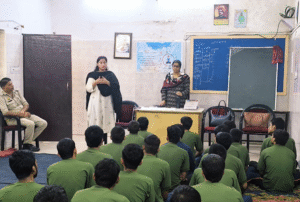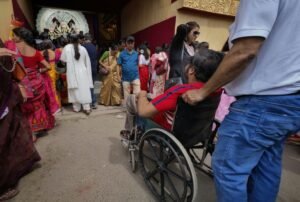
Back to Our Work
Juvenile Injustice? iProbono’s Study on Children in Adult Prisons

Our RTI-based report reveals the lapses in India’s juvenile justice system
iProbono India launched the report from an important study on the wrongful incarceration of children in prisons, along with an in-depth discussion around this often-overlooked issue.
The report, titled “Incarceration of Children in Prisons in India” was formally released by a Child in Conflict with the Law (CCL), who spoke movingly about how she had lost crucial years of her life in prison, despite having been below 18 years of age at the time of the alleged offence. “I spent six years of my life in prison,” she told the audience at the event. “I thought I would never see the world again. I had lost hope… and my childhood ended.”
iProbono helped secure her release in February 2024, after we received her case from our partner organisation India Vision Foundation in November 2023. iProbono’s team spent the next three months getting her case moved to the Juvenile Justice Board and proving that she was a minor at the time of the alleged offence. We argued that her pre-trial detention already exceeded the maximum sentence for a minor’s offence. As our report shows, this child is just one among thousands of such stories, pointing to systemic lapses in the implementation of the juvenile justice system.
Delivering the keynote address at the event, Justice S. Ravindra Bhat, former Supreme Court judge, also alluded to these failures and spoke of the need to hold the state accountable in such cases by making provisions for stringent monetary compensation. “(The) state is the parent, and (the) state is stealing their childhood. The least we can do is improve the system,” he said.
Panellists Arul Varma, Secretary, Delhi High Court Legal Services Committee; Amod K. Kanth, Founder General Secretary, Prayas JAC Society & Former DGP; Anant Kumar Asthana, Advisor to DSLSA on Victim Compensation and Legal Aid to Children; and Sunil Gupta, Former Legal Advisor Delhi Jails, also spoke about the responsibilities and failings of different judicial and government stakeholders. Gitanjali Prasad, the lead researcher and author, spoke about the data and highlighted the numerous failings in the legal ecosystem that the study has brought to light.
The findings of the study are deeply disturbing.
We found that at least 9,681 children had been wrongly incarcerated in adult prisons across the country between 1 January 2016 and 31 December 2021, with an average of just over 1600 children per year being transferred out of prisons, after being confirmed to be below 18 years at the time of the offence.
The actual number of CCLs in prisons is likely to be much higher. This can be gauged from the fact that we received responses on only 50% of the 124 RTIs filed by our team, and our data focused on only two categories of prisons. Further, the data was limited to CCLs who were successfully identified and transferred, and does not take into consideration those who were either not transferred to an appropriate juvenile home, or not identified at all.
Under the Juvenile Justice Act (2015), the Juvenile Justice Board has the statutory duty of conducting regular visits to adult prisons to check if a child is being lodged there, and to take immediate measures for the transfer of such a child to the appropriate juvenile home. The data we received reveals that in multiple states, including Delhi, no JJB visits were conducted over this six-year period.
These findings have received wide attention in the media, including reports in The Times of India, Hindustan Times, Live Mint, Economic Times, The Statesman, Leaflet, among others.
The report launch was followed by a panel discussion with key stakeholders, from the perspective of the juvenile justice boards, the police, the legal community and the prison system respectively.
You can watch the session and listen to these discussions on our YouTube channel.
The study was conceptualised by Gitanjali Prasad under the ambit of the Justice Leila Seth Fellowship. She led the research and writing in a voluntary capacity. The assistant researchers and authors are Krishna Sharma, Justice Leila Seth Fellow (2021-2022) and Yamina Rizvi, Program Officer, iProbono India.
For more on iProbono India’s work with child rights, follow the link.
*name changed to maintain privacy of the CCL











